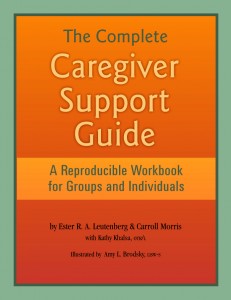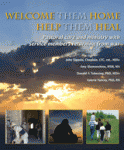The world of a caregiver can be lonely. While the tasks and experiences of caregiving may be similar in nature, surprisingly they are not what unites family caregivers. According to the National Family Caregivers Association, the common bond of caregiving is the emotional impact. Those caring for others often feel lonely, isolated, and unacknowledged for all their work and sacrifice. They can experience anger and resentment toward family members and others who carry on as usual, while they of necessity give up much of their normal life. They grieve the losses in their own lives as well as the loss of the person their care-receiver once was as they watch him or her decline. They often experience depression, sadness, pain, the need for normalcy and regret for what they might have done had circumstances been different. They also may feel guilty because they sometimes wish it were over.
Caregivers can find comfort in learning that such feelings are perfectly normal and in finding ways to copy with them in support groups. They can also find hope in the possibility of connecting on a deep level with their care-receiver and creating closer bonds with family members. In fact, discovering positive meaning in the tasks of caregiving is crucial for the emotional health of everyone involved. The entire caregiving family must honor the caregiver and acknowledge their importance in the scheme of things.
The Caregivers Bill of Rights below will help caregivers understand that their feelings are normal. It will help them verbalize what they need to the rest of the family and empower them to see their value. Post it where everyone can see it and honor its message.
Caregiver’s Bill of Rights
- I have the right to be told and relay the truth to the immediate family.
- I have the right to be upset when I receive bad news about my care-receiver.
- I have the right to talk about my care-receiver’s illness when appropriate, or not.
- I have the right to give constructive feedback, in a calm assertive way to a medical professional or establishment that is caring for my care-receiver.
- I have the right to disagree with my care-receiver, even though he or she is ill.
- I have the right to not accept any attempt by my care-receiver (either conscious or unconscious) to manipulate me through guilt, anger or depression.
- I have the right to engage outside help even though my care-receiver would prefer only me.
- I have the right to look after my own needs as well as my care-receiver’s needs. This is not an act of selfishness. It will increase my ability to care for him or her.
- I have the right to enjoy my good health and do what it takes to keep it that way.
- I have the right to recognize the limits of my own endurance and strength.
- I have the right to get help for myself when and if I need it.
- I have the right to receive consideration, affection, forgiveness, and acceptance from my care-receiver, when he or she is capable, providing I offer the same qualities.
- I have the right to be free of verbal, emotional or physical abuse from my care-receiver or my care-receiver’s family.
- I have the right to feel what I feel, when I feel it.
- I have the right to cry.
- I have the right to be angry and depressed and to express difficult feelings occasionally.
- I have the right to feel frustrated and/or angry and without feelings of guilt.
- I have the right to seek humor in difficult situations.
- I have the right to do some things just for myself.
- I have the right to protect my individuality and make a life for myself that will sustain me for the time when my care-receiver no longer needs my full-time help.
- I have the right to long for normalcy.
The article above was taken from The Complete Caregiver Support Guide by Ester R. A. Leutenberg and Carroll Morris with Kathy Khalsa. Click on the book to see details.


